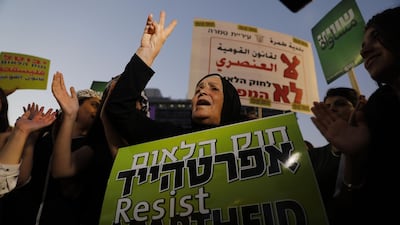"The people want the fall of the law!" chanted young demonstrators in a variation of the phrase used against regimes during the Arab uprising of 2011.
"The time has come to wake up!" read a sign carried by two Jewish women.
The mass protest Saturday in Tel Aviv was an unusual sight for Israel: a 30,000-strong crowd of Arabs thronging the streets alongside left-wing Jews and a small number from the Druze community. They had come together to oppose the government's racist Nation State Law that entrenches Israel's character as a Jewish state and relegates Arabs to second class citizenship.
But a day later on Sunday, the effort had not achieved the effect desired by its organisers. Instead, Israel’s political elite was manipulating the rally to further delegitimise the beleaguered and increasingly isolated Arab minority.
The numbers were large enough so that the risk of a flop did not materialise, and there was a significant presence of Jews alongside their Arab compatriots. But the mainstream reactions to the rally showed just how misunderstood and vulnerable to defamation the Arab citizens who make up one fifth of Israel's population are.
Israeli media coverage, photos and political reactions focused on a relatively small number of demonstrators who waved Palestinian flags at the protest, contrary to the urgings of organisers. The implication was that the protesters wanted to destroy Israel and not just the racist law.
The flag waving, in the coverage of the popular Ynet news site, was the most important aspect of the protest, not the speeches against the law, the voices of the diverse crowd of all ages who spoke of longing for equality, or the fact that Arabs and Jews had come together.
Leading the defamation of the protest was Prime Minister Benjamin Netanyahu, who, in remarks at a cabinet meeting Sunday cast the demonstrators as threatening fifth columnists. He said many of the protesters “want to nullify the law of return” that grants automatic citizenship to Jews, and “to nullify the anthem and the flag and convert Israel into an Israeli-Palestinian state or one of all its citizens. It is precisely because of this that we passed the Nation State Law."
"PLO flags have been unfurled in the heart of Tel Aviv and we have heard cries of 'with blood and spirit we will redeem you Palestine'," Nr Netanyahu said.
Arab legislator Ahmed Tibi voiced frustration with the media coverage of the event.
"Unfortunately, the media focused on what was secondary and missed the point,” he said. “To focus on twenty youths who carried flags because of their own conviction out of 30,000 is unprofessional and doesn't reflect reality." He added that the main message of the rally was simple: "cancel the Nation State law, we want to be equal."
The law, passed by a 62-55 vote in the Israeli parliament, is a Basic Law. That means it has de facto constitutional status. It says that only the Jewish people have the right to self-determination in the state of Israel and delineates the flag, emblem, anthem and symbols of the state. It demotes Arabic from being an official language to one with undefined “special status”.
Its most controversial clause puts Jews firmly in a superior position to non-Jews, specifying that “the state views the development of Jewish settlement as a national value and will act to encourage it and to promote and to consolidate its establishment”. The law makes no mention of equality and democracy.
______________
Read more:
Toll mounting as Hamas, Israel renew escalating fire
Israel and Hamas agree truce to end Gaza flare-up- Palestinian officials
Israel tank fire on Hamas outpost kills two
______________
At the protest, Mufid Shawarna, a fifty-year-old electrician from the central Israeli town of Jaljulya, gave voice to the sentiments of many.
"Of course this law threatens me. Tomorrow it will be an even more racist law and afterwards we will arrive at apartheid,” he told The National.
“Instead of making laws for people to live together, they seek to divide and categorise as first, second and third class citizens. Why? They should be promoting coexistence. It's rejected that they make laws that harm the Palestinian people who live here.”
The media and political reaction to the Arab protest contrasted sharply with the more welcoming attitude towards a protest against the law in Tel Aviv by members of Israel's Druze minority a week earlier. The Druze, unlike other Arab citizens, serve in the Israeli army and are sometimes depicted as “blood brothers”.
Reservist commanders were prominent at the Druze protest, which was adorned with many Israeli flags and avoided sharp denunciations of the government as being one of apartheid. Politicians were not wary of paying a price by associating with the Druze protesters.
Yet the same politicians stayed away from, and criticized, the Arab protest. They appeared concerned to be seen and depicted as lovers of 'the enemy’. Zionist Union leader Tzipi Livni, whose party voted against the law, said she could not attend because some of those who would protest do not share her vision of a Jewish State.
Yair Lapid, leader of the centrist Yesh Atid party not only avoided support of the Arab demonstrators but suggested Israel was democratic because it had tolerated the flag wavers. “It is interesting what would happen to someone who would try to march in downtown Ramallah with an Israeli flag," he tweeted.
Yet, in the face of this marginalisation and lack of support, protesters persisted in the heart of Israel’s second-largest city, making their voices heard.
“Jews and Arabs refuse to be enemies” chanted some of the marchers. Others held signs that read: "resist apartheid" and "this is our homeland".
But, as Israel’s nationalists increase their grip on the country they claim to be the only democracy in the Middle East, that homeland appears more distant than ever.

